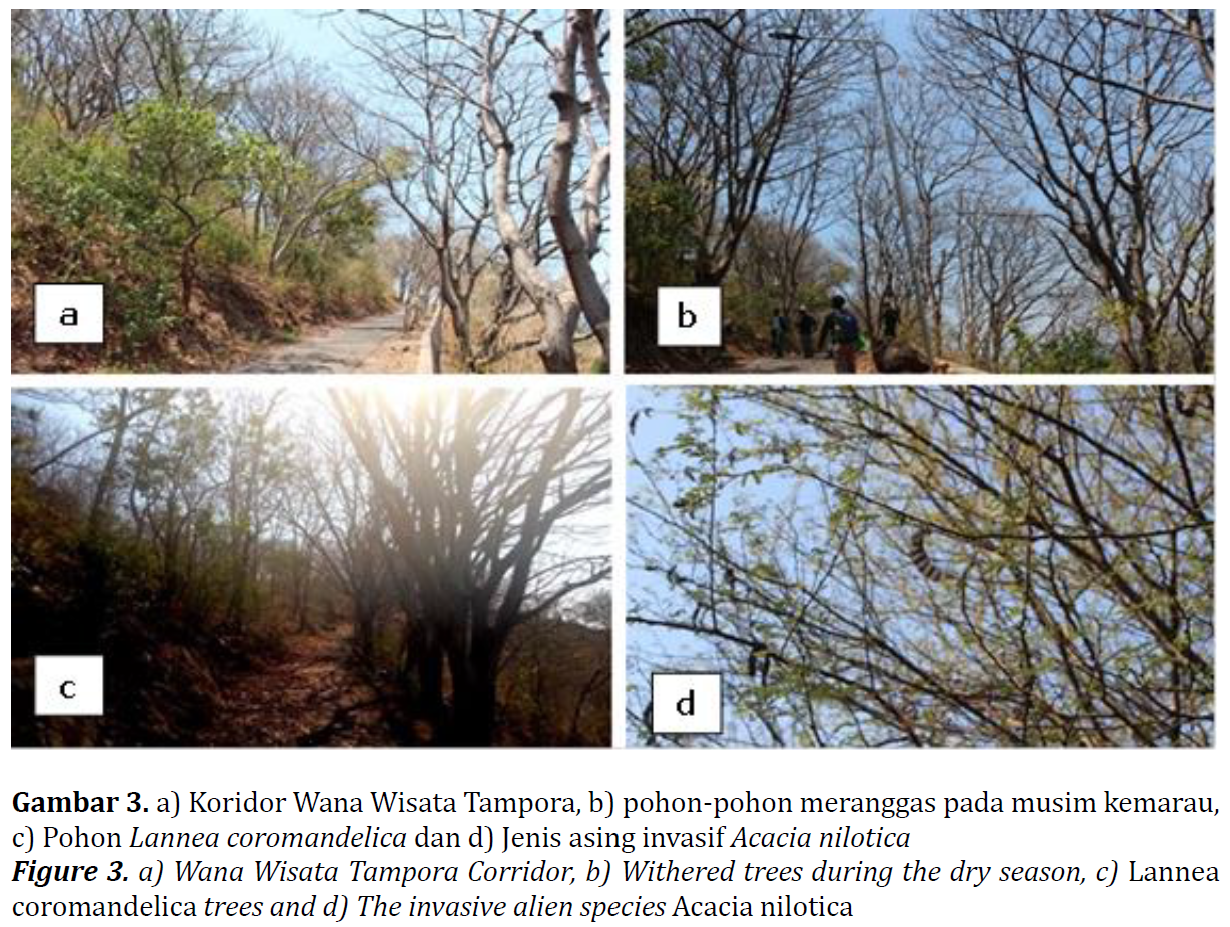Vegetation diversity and stand carbon stocks in Wana Wisata Tampora, Situbondo, East Java

Downloads
Downloads
Aba, S. C., Ndukwe, O., Amu, C. J., &Baiyeri, K. P. (2017). The role of trees and plantation agriculturein mitigating global climate change. African Journal of Food, Agriculture, Nutrition and Development, 17(4), 12691–12707.
Agbelade, A. D., Onyekwelu, J. C., & Oyun, M. B. (2017). Tree species richness, diversity, and vegetation index for federal capital territory, Abuja, Nigeria. International Journal of Forestry Research, 2017.
Agri-Resources, G. (2012). Laporan Peneltian Hutan Ber-stok Karbon Tinggi. Singapore: Golden Agri-Resources Ltd.
Ali, A. K., Ahmad, M. I., & Yusup, Y. (2020). Issues, impacts, and mitigations of carbon dioxide emissions in the building sector. Sustainability, 12(18), 7427.
Araz, O., Yilmazer Ucar, E., Aydın, Y., Meral, M., Bilen, Y., Alper, F., Gorguner, A. M., & Akgun, M. (2013). Effects of lymphadenopathy on pulmonary function tests in Sarcoidosis. Turkish Thoracic Journal/Türk Toraks Dergisi, 14(4), 152–157.
Banerjee, S., Banerjee, A., Palit, D., & Roy, P. (2019). Assessment of vegetation under air pollution stress in urban industrial area for greenbelt development. International Journal of Environmental Science and Technology, 16(10), 5857–5870.
Basari, Z. (2012). Tekmik pembongkaran tumbuhan invasif Acacia nilotica(L) Willd. Ex. Del dengan tirfor di Taman Nasional Baluran Jawa Timur. Jurnal Penelitian Hasil Hutan, 30(4), 279–290.
Danarto, S. A., & Yulistyarini, T. (2019). Seleksi tumbuhan dataran rendah kering yang berpotensi sekuestrasi karbon tinggi untuk rehabilitasi kawasan terdegradasi. Prosiding Seminar Nasional Masyarakat Biodiversitas Indonesia, 5(1), 33–37.
Dawud, S. M., Raulund-Rasmussen, K., Domisch, T., Finér, L., Jaroszewicz, B., & Vesterdal, L. (2016). Is tree species diversity or species identity the more important driver of soil carbon stocks, C/N Ratio, and pH? Ecosystems, 19(4), 645–660.
Dinas Pekerjaan Umum Situbondo. (2019). Profil Kabupaten Situbondo. Situbondo: Cipta Karya.
Fawzy, S., Osman, A. I., Doran, J., &Rooney, D. W. (2020). Strategies for mitigation of climate change: a review. Environmental Chemistry Letters, 18(6), 2069–2094.
Fiqa, A. P., Fauziah, Lestari, D. A., & Budiharta, S. (2019). The importance of in-situ conservation area in mining concession in preserving diversity, threatened, potential floras in East Kalimantan, Indonesia. Biodiversitas, 20(1), 198–210.
Fujii, H., &Managi, S. (2016). Economic development and multiple air pollutant emissions from the industrial sector. Environmental Science and Pollution Research, 23(3), 2802–2812.
Hairiah, K., Dewi, S., Agus, F., Velarde, S., Ekadinata, A., Rahayu, S., & Van Noordwijk, M. (2010). Measuring Carbon Stocks Across Land Use Systems(AManual).Bogor: World Agroforestry Centre (ICRAF).
Hossain, M. J., Biswas, S., Shahriar, M., Chowdhury, M. M., Islam, S., Ahsan, C. R., & Auther, C. (2018). Phytochemical screening, antimicrobial activity, antioxidant capacity and in vivo anticancer activity of Lannea coromandelica bark extracts. IOSR Journal of Pharmacy and Biological Sciences Ver. II, 13(3,Ver II), 19–25.
Indriyanto. (2006). Ekologi Hutan. Jakarta: PT Bumi Aksara.
Jerath, M., Bhat, M., Rivera-Monroy, V. H., Castañeda-Moya, E., Simard, M., & Twilley, R. R. (2016). The role of economic, policy, and ecological factors in estimating the value of carbon stocks in Everglades Mangrove Forests, South Florida, USA. Environmental Science and Policy, 66, 160–169.
Kent, M., &Coker, P. (1992). Vegetation Description and Analysis: A Practical Approach. New York: John Wiley and Sons.
Ketterings, Q. M., Coe, R., Van Noordwijk, M., Ambagau’, Y., & Palm, C. A. (2001). Reducing uncertainty in the use of allometric biomass equations for predicting above-ground tree biomass in mixed secondary forests. Forest Ecology and Management, 146(1–3), 199–209.
Kohl, M., Neupane, P. R., & Lotfiomran, N. (2017). The impact of tree age on biomass growth and carbon accumulation capacity: A retrospective analysis using tree ring data of three tropical tree species grown in natural forests of Suriname. PLoS ONE, 12(8), 1–17.
Koten, B. B., Lita, Y., Wea, R., & Dato, T. O. D. (2020). Respon tanaman pakan Arbila (Phaseolus lunatus. L) terhadap volume air yang berbeda di musim kemarau. Pastura, 10(1), 9–12.
Ladiana, N. (2013). Kolaborasi Pengembangan Destinasi Wisata Tampora Desa Kalianget Kecamatan Banyuglugur Kabupaten Situbondo. Jember: Universitas Jember.
Lawal, A., Ademujim, B. P., & Oladoyinbo, B. M. (2018). Eco-physiological variation and adaptationmechanism of Azadirachta indicaA. JUSS in Nigeria. Journal of Forestry Research and Management, 15(1), 66–85.
Magurran, A. E. (1983). Ecological Diversity and Its Measurement. Princeton: Princeton University Press.
Mansur, M. (2020). Vegetasi pohon dan persebarannya di Taman Wisata Alam Gunung Tunak dan Hutan Karamat Mandalika, Lombok Tengah, Provinsi Nusa Tenggara Barat. Berita Biologi, 19(2), 185–195.
Markum, Arisoesilaningsih, E., Suprayogo, D., & Hairiah, K. (2013). Plant species diversity in relation to carbon stocks at jangkok watershed, Lombok Island. Agrivita, 35(3), 207–218.
Mitchard, E. T. A. (2018). The tropical forest carbon cycle and climate change. Nature, 559(7715), 527–534.
Mohanta, M. R., Mohanta, A., Mohapatra, U., Mohanty, R. C., & Sahu, S. C. (2020). Carbon stock assessment and its relation with tree biodiversity in Tropical Moist Deciduous Forest of Similipal Biosphere Reserve, Odisha, India. Tropical Ecology, 61(4), 497–508.
Natalia, D., Arisoesilaningsih, E., & Hairiah, K. (2017). Are high carbon stocks in agroforests and forest associated with high plant species diversity? Agrivita, 39(1), 74–82.
Rochmayanto, Y., Wibowo, A., Lugina, M., Butarbutar, T., Mulyadin, R., & Wicaksono, D. (2014). Cadangan karbon pada berbagai tipe hutan dan jenis tanaman di Indonesia. Yogyakarta: PT. Kanisius.
Rohman, F., Novianti, V., Sumberartha, I. W., & Kiswojo. (2018). Provide biodiversity monitoring for period 2018 consist of:Biodiversity index of flora and fauna, include micro climate condition, POH II (Permanent Operational Housing II), Selobanteng, Tampora, and Banyuglugur. Universiras Negeri Malang and PT. POMI.
Saatchi, S. S., Harris, N. L., Brown, S., Lefsky, M., Mitchard, E. T. A., Salas, W., Zutta, B. R., Buermann, W., Lewis, S. L., Hagen, S., Petrova, S., White, L., Silman, M., & Morel, A. (2011). Benchmark map of forest carbon stocks in tropical regions across three continents. Proceedings of the National Academy of Sciences of the United States of America, 108(24), 9899–9904.
Situmeang, B., Nuraeni, W., Ibrahim, A. M., & Silaban, S. (2016). Analysis of secondary metabolite compounds from leaves extract kesambi (Schleichera oleosa) and antioxidant activity test. Pendidikan Kimia, 8(3), 164–168.
Sujarwo, W., & Keim, A. P. (2017). Ethnobotanical study of traditional building materials from the island of Bali, Indonesia. Economic Botany, 71(3), 224–240.
Susila, I. W. W. (2020). Pendugaan volume, potensi dan dominasi jenis bidara laut (Strychnos lingustrinaBlume) sebagai bahan baku obat Bali Barat. Jurnal Penelitian Kehutanan FALOAK, 4(1), 39–56.
Talukdar, S. N., Rahman, M. B., & Paul, S. (2015). A review on Barleria prionitis: Its pharmacognosy, phytochemicals and traditional use. Journal of Advances in Medical and Pharmaceutical Sciences, 4(4), 1–13.
Warren, M., Frolking, S., Dai, Z., &Kurnianto, S. (2017). Impacts of land use, restoration, and climate change on tropical peat carbon stocks in the twenty-first century: implications for climate mitigation. Mitigation and Adaptation Strategies for Global Change, 22(7), 1041–1061.
Yadav, A. K., Khan, M. E., Pal, A., & Dubey, A. M. (2017). Experimental investigations of performance and emissions characteristics of Kusum (Schleichera oleosa) biodiesel in a multi-cylinder transportation diesel engine. Waste and Biomass Valorization, 8(4), 1331–1341.
Zanne, A. E., Lopez-Gonzalez, G., Coomes, D. A., Ilic, J., Jansen, S., Lewis, S. L., Miller, R. B., Swenson, N. G., Wiemann, M. C., & Chave, J. (2009). Data from: Towards a worldwide wood economics spectrum, Dryad, Dataset.
Zhu, J. X., Hu, X. Y., Yao, H., Liu, G. H., Ji, C. J., &Fang, J. Y. (2015). A significant carbon sink in temperate forests in Beijing: based on 20-year field measurements in three stands. Science China Life Sciences, 58(11), 1135–1141.








